In this article:
The brain is a complex and powerful part of the human body that keeps working continuously from birth until death. This amazing organ keeps track of all our thoughts, creativity, emotions, movements, sensations, and memories.
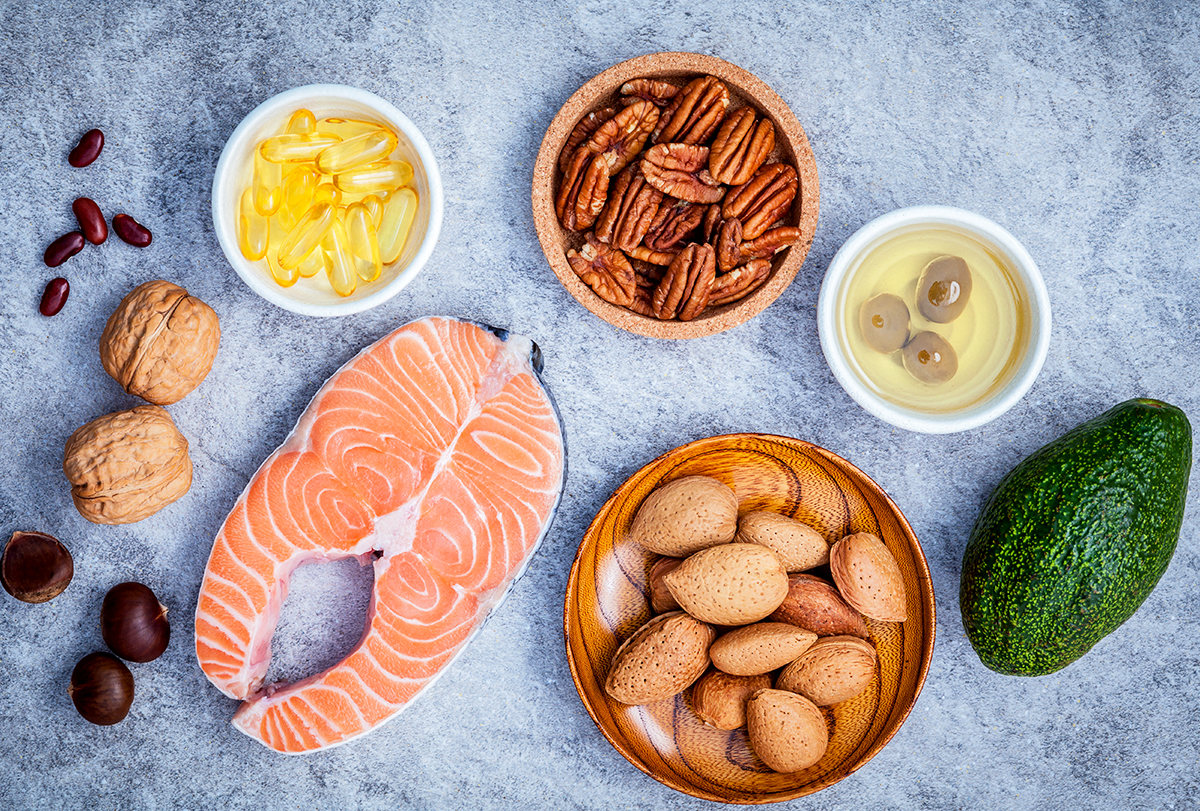
For the brain to work continuously and support other organs, it must have a steady supply of essential nutrients from our diet, blood sugar, and oxygen. Being deprived of essential nutrients can lead to oxidative damage, inflammation, and injury to the brain tissues. This can jeopardize the sound functioning of the brain, including memory, mood, cognition, and concentration.
Through a well-balanced wholesome diet of flavonoids, omega-3 fatty acids, vitamins, folate, and minerals such as potassium, iron, and calcium, you can improve your memory, promote sharpened reflexes, improve your cognition, and help ward off neurodegenerative diseases such as Alzheimer’s disease, Parkinson’s disease, and dementia.
Best Foods for Brain Health
To promote good health and provide the human body with essential nutrients, you need to make smart food choices in your daily diet. This can help strengthen your brain and enhance your mental performance.
Listed below are foods that boast a rich nutritional profile to help the brain function at its best.
1. Chow down on walnuts to boost brain power
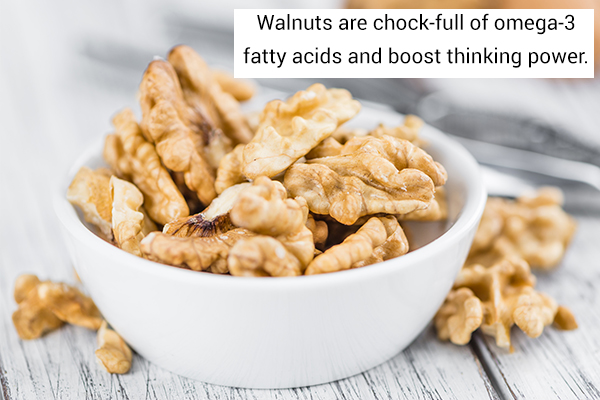
Walnuts are chock-full of omega-3 fatty acids and boost thinking power. Omega-3 fatty acids have a protective effect on the brain as they rev up the functioning of neurotransmitters, which in turn improves memory and cognitive skills. (1)
The presence of polyphenols in walnuts aids in inflammation by working with the brain cells to combat oxidants. Walnuts also contain memory-protective vitamin B6 and magnesium.
All these improve interneuronal signaling, increase neurogenesis, and enhance the elimination of toxic proteins, (2) which play a role in many debilitating and degenerative conditions of the brain and body.
How to consume:
If you’re looking for a healthy snack, munch on a handful of walnuts.
2. Consume avocados for cognitive health
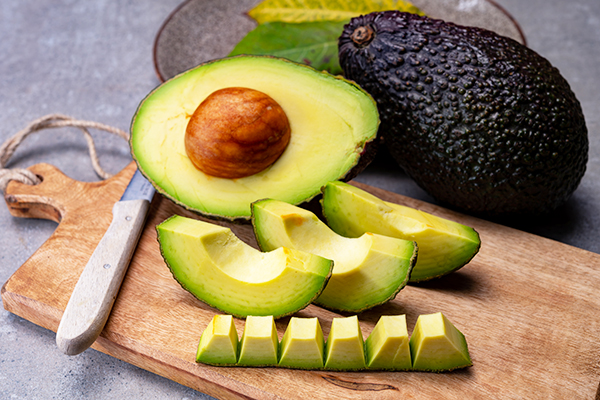
Avocados are packed with copious amounts of monounsaturated fat, vitamin K, folate, and vitamins C and B. These vitamins are known to encourage cognitive function by promoting concentration and memory.
Packed with good fats, potassium, healthy monounsaturated fats, and vitamin B6 and C, avocados help maintain blood pressure. The presence of vitamin K helps prevent the formation of blood clots in the brain and protect you from cardiovascular ailments. (3)
A 2017 study published in Nutrients found that including avocados in the diet can help increase a biomarker of brain lutein, macular pigment density (MPD). Increased MPD levels are correlated with better cognitive performance. (4)
How to consume:
Include a quarter avocado a day in your spreads and dips, as a filler in your toasts, or as one of the ingredients of your smoothies.
3. Improve your cognitive performance with green tea

Of late, green tea has been on the radar of scientists for its exemplary antioxidant properties. Recent studies have hinted towards green tea as a team member of foods that help boost brain function.
Researchers at the University of Basel concluded that green tea extract increases the brain’s electrical connectivity, which in turn enhances cognitive functions and helps treat dementia. (5)
Green tea influences cognition and brain function in a positive way. (6)
Also, older people with a daily intake of green tea have a lesser chance to develop Parkinson’s disease due to enhanced cognitive performance. (7)(8)
How to consume:
Drink 2–3 cups of freshly brewed green tea – hot or iced – to boost brain power.
Note: Exercise caution when drinking green tea if you are pregnant or breastfeeding. Drinking high amounts of green tea on an empty stomach or in a concentrated form such as a powder or supplement without checking with a doctor can result in gastric distress and hepatotoxicity. It is advised to consult a doctor before you include green tea in your diet.
4. Take a bite of dark chocolate to enrich your grey matter
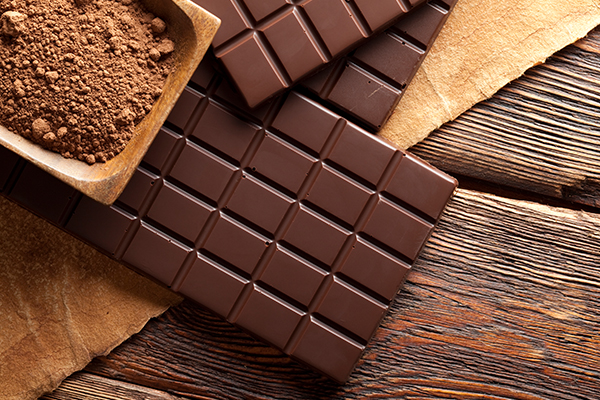
The richness of flavonoids in dark chocolate may augment cognitive performance while reducing blood pressure and decreasing insulin resistance.
Flavonoids, being an antioxidant, can help decrease blood pressure, manage weight, and prevent cardiovascular diseases. (9) Prolonged use of flavonoids can synergistically affect cognitive function by influencing neuron signaling. (10)
Aside from supporting cognitive performance, the intake of cocoa flavanols can aid in improving concentration, speed, and memory, especially when fatigued or sleepless. (11) Consuming chocolates in stressful situations can help uplift your mood. (12)
How to consume:
Indulge in a square of dark chocolate to boost brain power. Choose chocolates containing at least 70 percent or more cocoa.
Note: Keeping in mind the fact that cocoa contains caffeine that can cause irregularities in heartbeat, people with heart conditions need to be cautious when consuming chocolates.
5. Munch on almonds to retain memory
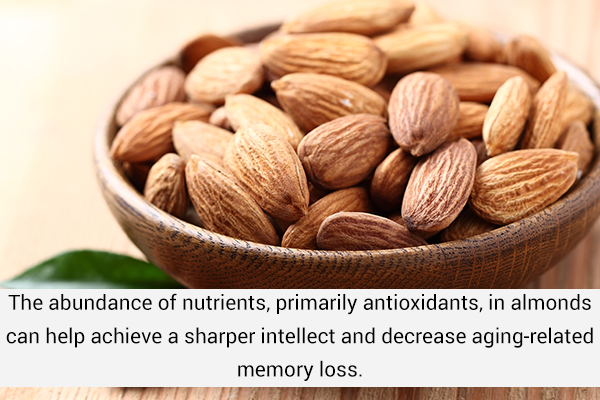
Almonds are an excellent food item to snack on. Aside from containing scads of healthy fats, they are also rich in protein, vitamins, fiber, calcium, magnesium, and more.
A 2016 study published in Brain Research Bulletin highlighted the regular use of almonds for 28 days with memory retention. (13) The abundance of nutrients, primarily antioxidants, in almonds can help achieve a sharper intellect and decrease aging-related memory loss.
6. Have an eggcellent meal for brain health
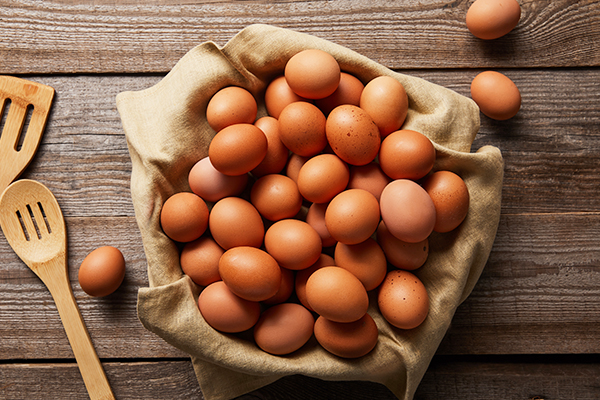
Besides being famous as a rich source of cholesterol, eggs also contain several other nutrients necessary for upgrading brain health, including vitamins B6 and B12, folate, and choline. (14)
Choline is the precursor for the synthesis of the chemical neurotransmitter acetylcholine, which regulates signaling, mood, and memory. In addition, folate and vitamin B12 have several roles in brain health, including roles in mood management.
A study from the Brown School at Washington University in St. Louis found that infants introduced to eggs at the sixth month of life had higher concentrations of choline and docosahexaenoic acid (DHA). (15)
How to consume:
Include eggs as part of your diet.
7. Boost your brain with blueberries
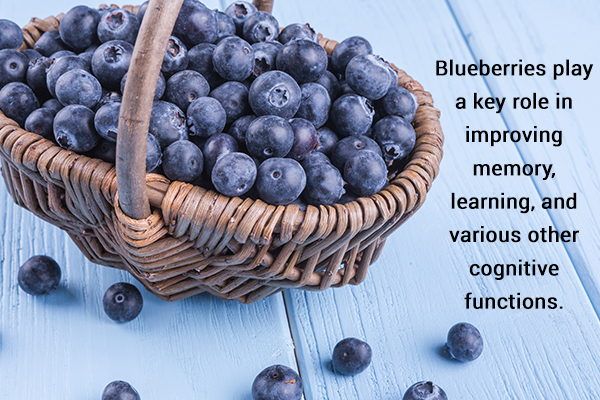
To keep your memory sharp even as you age, eat blueberries. The flavonoids, anthocyanin, caffeic acid, catechin, quercetin, kaempferol, and tannins found in blueberries have a neuroprotective effect. They play a key role in improving memory, learning, and various other cognitive functions. (16)
Flavonoids help protect the brain from age-related disorders by preventing free radical damage, which can harm healthy tissue and are associated with neurodegenerative disorders such as Alzheimer’s and Parkinson’s diseases. (17)
How to consume:
To give your brain a boost, eat ½ cup of blueberries daily.
8. Consume spinach to prevent neuronal damage
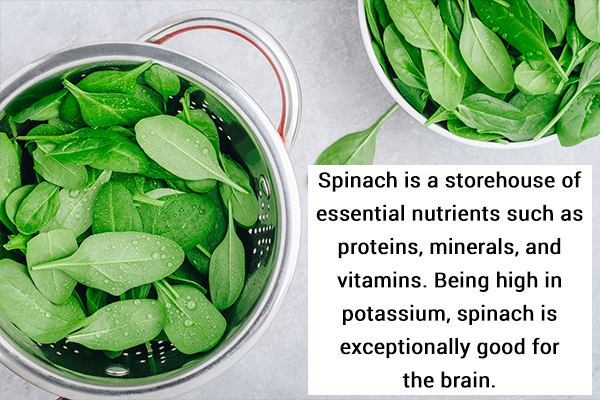
Spinach is a storehouse of essential nutrients such as proteins, minerals, and vitamins. Being high in potassium, spinach is exceptionally good for the brain.
Potassium helps maintain the electrical conductivity of the brain. This helps produce lightning-fast signals between neurons, which in turn improves thinking and recall capacity.
The antioxidant content in spinach protects the brain cells from oxidative damage. This leafy green vegetable is also loaded with nutrients including folate, magnesium, and vitamins E and K, which help prevent dementia in diseases such as Alzheimer’s. (18)
A study conducted on more than 200 women established that consuming foods rich in folate and vitamin B6, such as spinach and other dark leafy greens, may help improve mental acumen and short-term memory. (19)
How to consume:
Eat spinach and other green vegetables to aid your memory.
Note: Spinach can cause a drop in blood sugar levels. If you are a diabetic, monitor your blood sugar levels closely when taking spinach along with medications.
9. Feast on wild salmon for omega-3 fatty acids
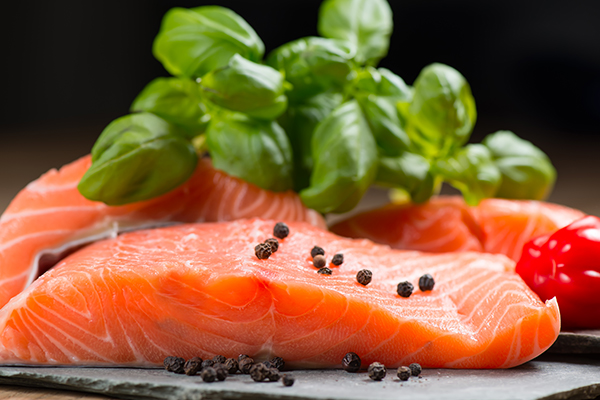
The brain is composed of 70 percent fat. The body requires essential fatty acids such as omega-3s from the diet to maintain brain health. Salmon is a good source of omega-3 fatty acids, and consuming salmon is an excellent way to boost brain power. (20)
More specifically, salmon is high in DHA that can prevent the onset of Alzheimer’s disease. Plus, omega-3 fatty acids help reduce inflammation and support increased flow of blood to the brain. (21)
How to consume:
Prefer only wild salmon, as farmed salmon contains high levels of mercury and PCBs that can have adverse effects on the brain.
10. Consume acorn squash to fight dementia
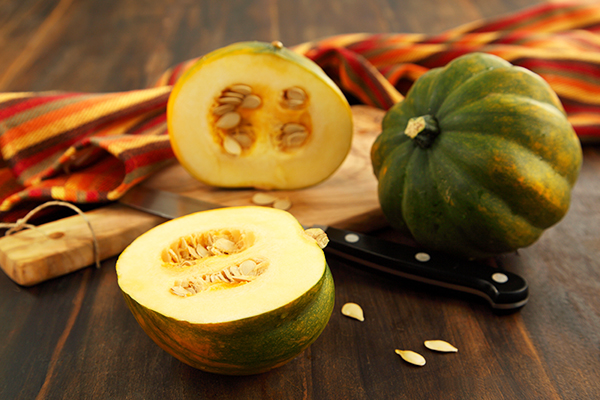
Acorn squash, also known as winter squash, is a rich source of folate. (22)
Folate is of primordial importance to the development of the nervous system in all ages. The deficiency of folic acid in the elderly can affect mood and cognitive function and contribute to age-related brain damage with an increased risk of Alzheimer’s disease and vascular dementia. Severe deficiency can cause reversible dementia. (23)
The folic acid along with vitamin B12 present in acorn squash is also reported to prevent nerve damage and brain shrinkage. A deficiency of folic acid can cause birth defects of the brain. (24)
How to consume:
Bake or roast acorn squash to reap its brain-boosting benefits.
11. Spice up your diet with turmeric
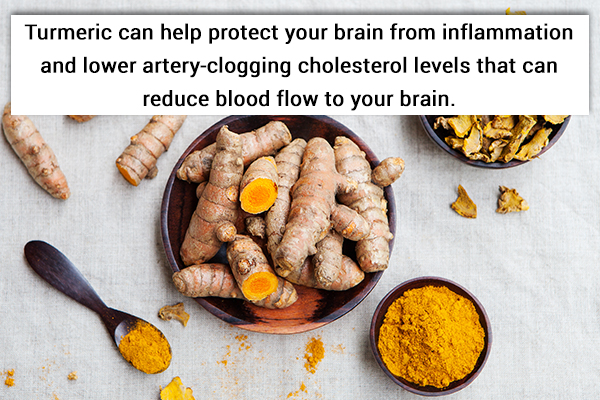
Turmeric contains the powerful antioxidant and anti-inflammatory compound curcumin, which can help ease oxidative damage, inflammation, anxiety, arthritis, hyperlipidemia, and metabolic syndrome. (25)
Turmeric can also help protect your brain from inflammation and lower artery-clogging cholesterol levels that can reduce blood flow to your brain. Curcumin helps relieve the symptoms of Alzheimer’s disease caused by inflammation and oxidative damage. (26)
How to consume:
To a glass of warm milk, sprinkle a little turmeric powder and drink it every day. Also, add turmeric in your cooking.
Note: Consider taking your doctor’s advice when on blood thinners such as warfarin (Coumadin), clopidogrel (Plavix), and aspirin, as turmeric may aggravate the action of blood-thinning drugs, leading to unwanted bleeding.
12. Eat broccoli to strengthen memory
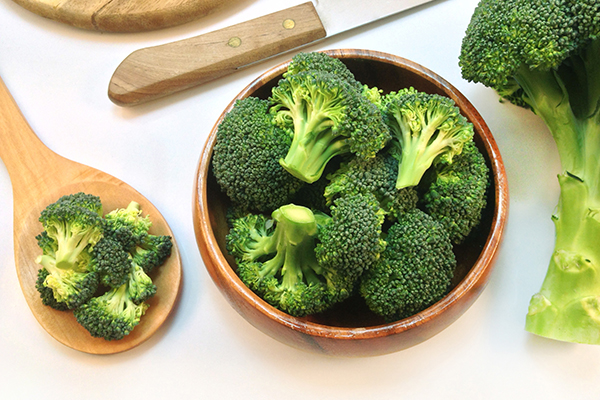
Broccoli contains a compound known as choline, which is a precursor of the neurotransmitter acetylcholine. Choline has the potential to spur the growth of new brain cells and neural connections that are essential for sharp and strong memory.
Choline plays a pivotal role in fetal development. A deficiency of choline can modify the structure of the brain and spinal cord resulting in neural tube defects. (27)
Also, being an excellent source of vitamin K and glucosinolates, broccoli enhances cognitive functioning and improves brain power. (28)
How to consume:
One cup of broccoli three times a week will boost your brain power.
13. Include tomatoes in your meals
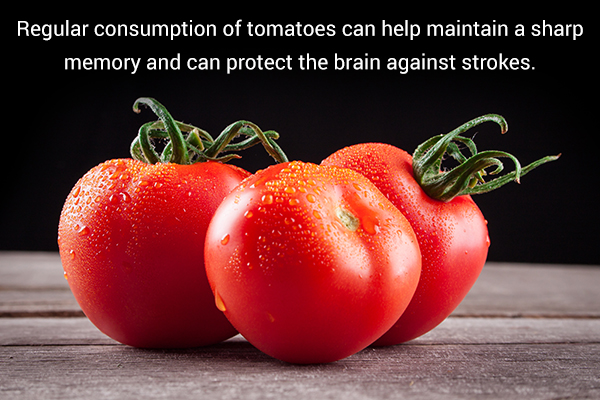
The memory-boosting power of tomatoes is attributed to the presence of the antioxidant lycopene. Lycopene protects the cells by scavenging free radicals that can cause dementia and Alzheimer’s disease.
Hyperlipidemia can induce neurodegenerative diseases such as Alzheimer’s and Parkinson’s diseases by damaging the brain tissue. Lycopene has protective effects on injury induced by hyperlipidemia. (29)
Regular consumption of tomatoes can help maintain a sharp memory and can protect the brain against strokes. (30)
How to consume:
Use tomatoes in your salad or mouth-watering soups to power your brain.
Expert Answers (Q&A)
Answered by Ms. Lily Chen, MS, APD, FAND (RDN)
Consuming high amounts of alcohol, red and processed meats, sweets, and saturated fats may be detrimental to brain development.
Nuts are a rich source of phytochemicals, vitamins, and minerals which greatly contribute to brain health. Research has shown nuts to be beneficial by improving cholesterol levels and improving cognitive function.
Dry fruits also have high amounts of antioxidants, but it is best to consume them in moderation as dry fruits generally contain high amounts of sugar.
The MIND diet is a hybrid of the Mediterranean diet and the DASH diet (Dietary Approaches to Stop Hypertension) which focuses on foods beneficial for brain health.
Similar to the Mediterranean diet and the DASH diet, the MIND diet focuses on plant-based foods with an emphasis on berries and green leafy vegetables and limited intakes of animal and saturated fats.
Bananas are a good source of prebiotics which are beneficial for gut health and brain health. Bananas also contain a high amount of vitamin B6, which is important for brain development during pregnancy and infancy.
Incorporating physical activity will help improve overall health and therefore, brain health. Learning new things or undergoing new experiences will help with neuroplasticity. Neuroplasticity is the brain’s ability to adapt, modify, and change to ultimately rewire the brain to achieve a new skill or habit.
• Water is important in brain development, especially in older adults. Dehydration may affect mood and cognitive performance.
• Dark chocolate contains flavanols which have been shown to help individuals suffering from brain impairment.
• Coffee contains many phytochemicals which are beneficial for heart health and in turn, brain health. Studies have shown caffeine may help protect the brain against cognitive decline.
• Tea, especially green tea, is also a powerhouse of phytochemicals. The most notable one is EGCG (epigallocatechin-3-gallate), which has been shown to prevent amyloid formations associated with Alzheimer’s disease.
• Resveratrol is a compound found in wine, grape juice, and dark chocolate. It has been shown to block the formation of proteins contributing to Alzheimer’s disease. However, research is in the preliminary stages and further investigations are needed.
Final Word
Your brain is armed and awake 24/7 without missing a thing. With the ability to stay connected with all that goes inside your body, your brain needs nourishment and energy to keep working effectively. To bolster your brain to work at its optimal level, the most promising tool is your dietary intake.
Foods rich in antioxidants, essential fats, vitamins, and minerals can combat oxidative damage, kick out stress, uplift your mood, enhance your memory, improve your cognitive health, and halt the onset of neurodegenerative disorders. To give your brain a boost, include these foods in your daily diet.
- Was this article helpful?
- YES, THANKS!NOT REALLY


